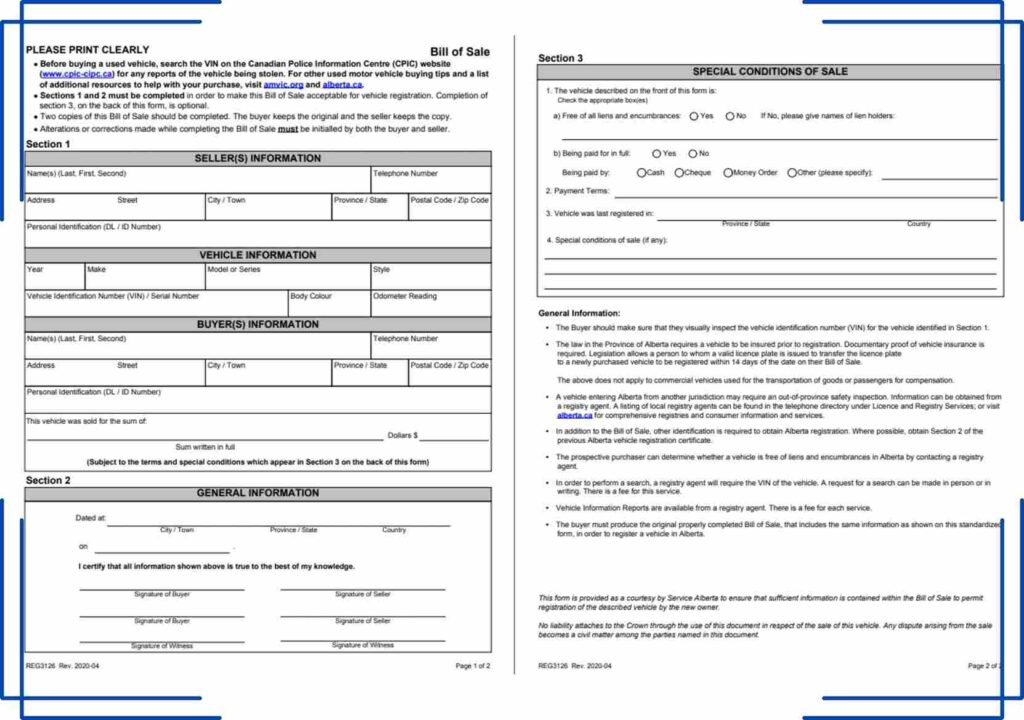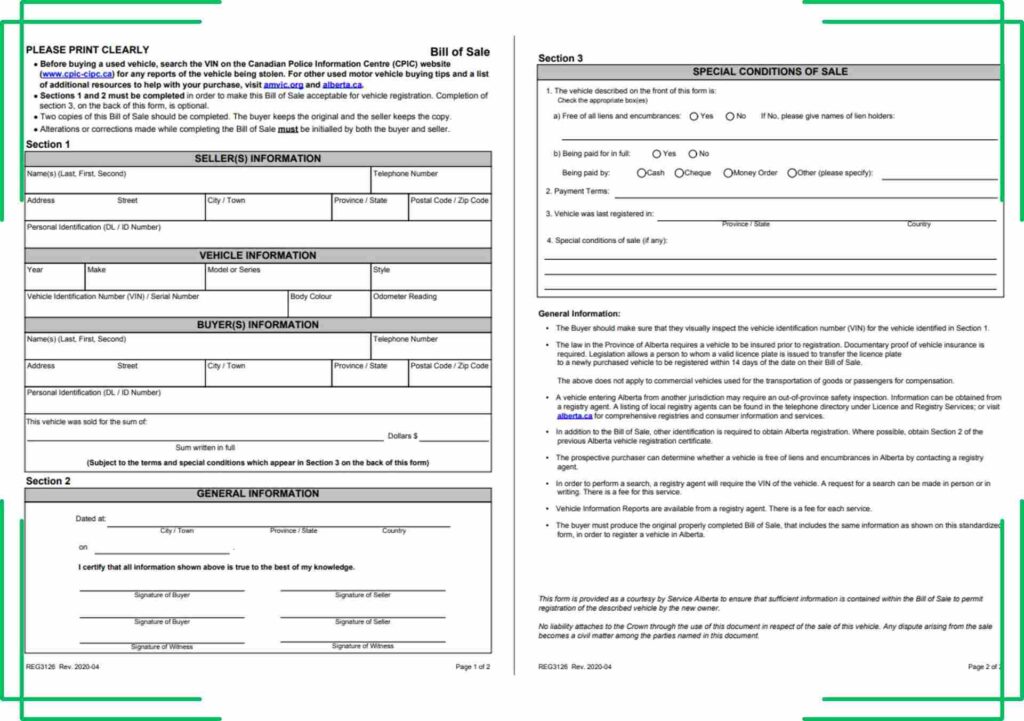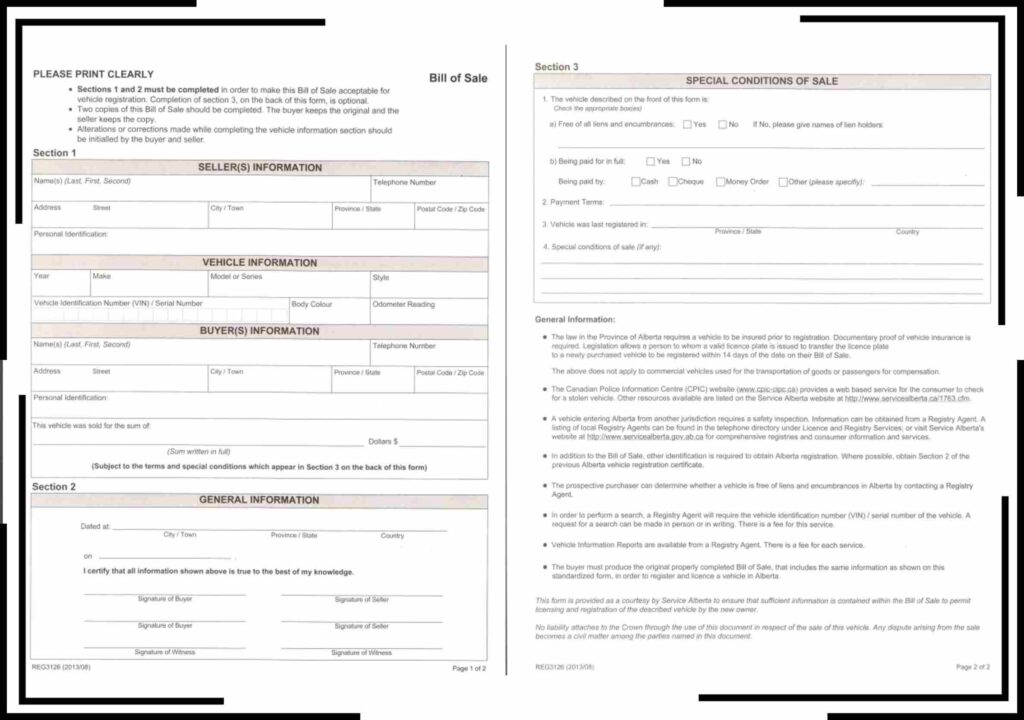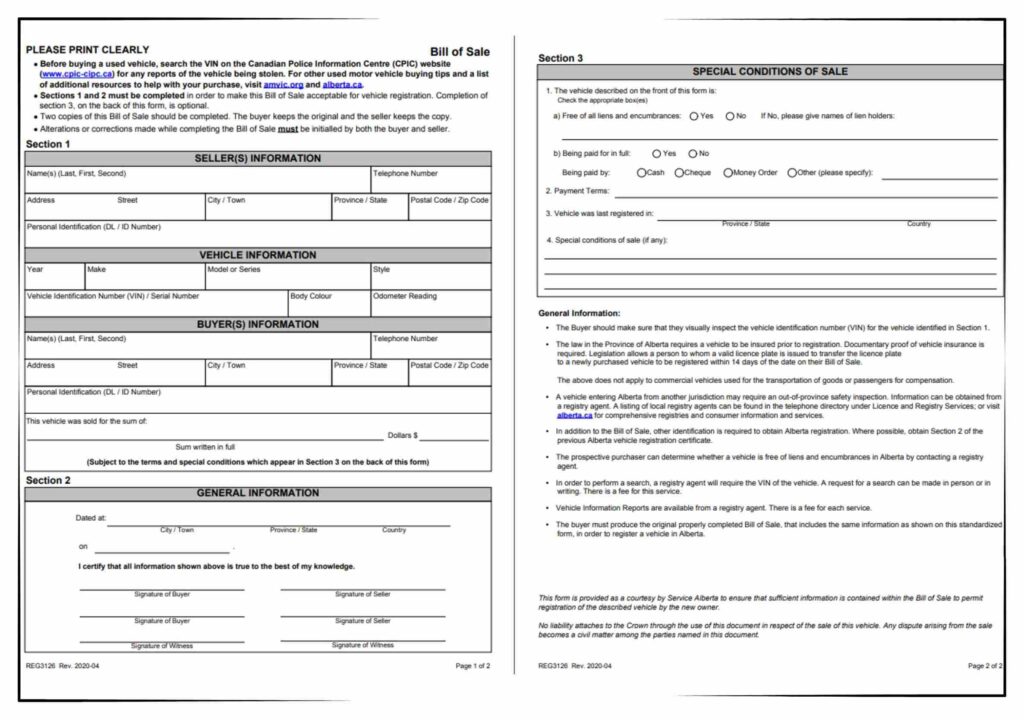In the province of Alberta, Canada, an Alberta Vehicle Bill of Sale, is a legal document that serves as a crucial record of the transfer of ownership for motor vehicles. This document is specifically designed for private vehicle sales within Alberta and plays a pivotal role in documenting and formalizing the transaction between the seller and the buyer.
The Alberta Bill of Sale Vehicle holds significant importance and legal significance for both the seller and the buyer involved in the private sale of a vehicle. Firstly, it provides an official record of the sale, documenting essential details such as the sale date, seller and buyer information, vehicle description including the Vehicle Identification Number (VIN), odometer reading, and sale price.
Moreover, from a legal standpoint, the Province of Alberta Vehicle Bill of Sale offers crucial legal protection to both parties. It establishes a clear record of the transfer of ownership, which can be invaluable in case of any future disputes or disagreements regarding the sale. Additionally, for the buyer, the Alberta Bill of Sale for Vehicle serves as initial proof of ownership, facilitating the process of registering the vehicle under their name with the Alberta Motor Vehicle Registry (AMVR).
In essence, the Vehicle Bill of Sale Alberta plays a vital role in ensuring a smooth, transparent, and legally valid transfer of vehicle ownership within the province of Alberta, thereby providing peace of mind to both buyers and sellers involved in private vehicle transactions.
Table of Contents
ToggleFree Alberta Vehicle Bill of Sale Printable
Free Alberta Vehicle Bill of Sale Printable
Alberta Motor Vehicle Bill of Sale
The Alberta Motor Vehicle Bill of Sale holds significant importance whenever a vehicle transaction occurs within the province. Its primary functions are:
- Proof of Ownership Transfer: This document serves as legal evidence indicating that the vehicle’s ownership has transitioned from the seller to the buyer. This proof is vital for the registration process under the new owner’s name.
- Sales Agreement Record: It functions as a detailed record of the sale, encompassing crucial details like the purchase price. This record acts as a reference point for both parties in case of any future disputes or disagreements.
There are two main types of bills of sale utilized for vehicle transactions in Alberta:
- Standard Bill of Sale: This commonly used form is employed in private sales between individuals. It captures essential information about the buyer, seller, and the vehicle. A standard bill of sale template can be accessed on the Alberta government website.
- Comprehensive Bill of Sale: Dealerships utilize this type of bill of sale, providing a more detailed account of the transaction compared to the standard version. Alongside buyer/seller and vehicle information, it includes specifics about the vehicle’s condition, warranties (if any), and a breakdown of the purchase price. This offers enhanced protection for the buyer in case of unforeseen issues with the vehicle.
A valid Alberta Motor Vehicle Bill of Sale typically includes the following information:
- Seller’s Details: Full name and address
- Buyer’s Details: Full name and address
- Vehicle Description: Make, model, year, Vehicle Identification Number (VIN), and color
- Sale Details: Date of sale and purchase price
- Signatures: Signatures of both the buyer and seller
After completing and signing the bill of sale, it is imperative to visit a registry agent for the vehicle transfer registration process. This procedure usually incurs a fee.
Alberta Motor Vehicle Bill of Sale
Alberta Vehicle Bill of Sale PDF
Alberta Vehicle Bill of Sale PDF
Alberta Motor Vehicle Bill of Sale PDF
Alberta Motor Vehicle Bill of Sale PDF
Legal Requirements and Significance of an Alberta Vehicle Bill of Sale
An Alberta Vehicle Bill of Sale is a legal document that plays a critical role in ensuring a smooth and secure transfer of vehicle ownership between a buyer and seller. Here’s a breakdown of its mandatory nature, role in ownership transfer, and its significance in complying with Alberta Motor Vehicle Registry (AMVR) regulations:
Mandatory Nature for Private Vehicle Sales in Alberta
In Alberta, a bill of sale is mandatory for all private vehicle sales. This means if you’re selling a vehicle to someone other than a registered dealer, you must have a completed and signed bill of sale. There’s no getting around it! This requirement is outlined by the AMVR to ensure proper documentation and protect both the buyer and seller during the ownership transfer process.
Role in Transfer of Ownership
The bill of sale acts as the legal record that officially transfers ownership of the vehicle from the seller to the buyer. It serves as concrete proof of the sale and is essential for several reasons:
- Registration and Licensing: The buyer cannot register and license the vehicle under their name without a valid bill of sale. The AMVR requires this document as part of the ownership transfer process.
- Protection for Buyer and Seller: The bill of sale serves as a reference point for both parties in case of any future disagreements regarding the sale. It documents the agreed-upon purchase price, vehicle details, and date of sale.
Ensuring Compliance with Alberta Motor Vehicle Registry (AMVR) Regulations
A compliant bill of sale is crucial for ensuring adherence to AMVR regulations. Here’s how it helps:
- Accurate Information: The bill of sale ensures all necessary details about the buyer, seller, and vehicle are accurately documented. This helps the AMVR maintain a clear record of ownership changes.
- Preventing Fraud: A proper bill of sale reduces the risk of fraud by providing a verifiable record of the sale. This protects both the buyer from unknowingly purchasing a stolen vehicle and the seller from potential liability issues.
- Streamlined Transfer Process: Having a completed bill of sale simplifies the vehicle registration process for the buyer at a registry agent. It avoids delays or complications due to missing documentation.
By fulfilling these requirements, the Alberta Vehicle Bill of Sale ensures a smooth ownership transfer process that adheres to provincial regulations and protects both the buyer and seller.
Importance and Benefits
The Alberta Vehicle Bill of Sale is more than just a piece of paper; it’s a crucial document that offers substantial benefits to both buyers and sellers during private vehicle sales. Let’s explore how it provides significant advantages:
Official Documentation of Sale:
The bill of sale serves as an official record of the vehicle sale transaction, documenting vital information such as the date of sale and agreed-upon purchase price. This eliminates any confusion or ambiguity regarding the terms of the agreement.
Legal Protection for Both Parties:
In case of any future disputes or disagreements related to the sale, the bill of sale acts as essential legal documentation. For instance, if the buyer encounters undisclosed issues with the vehicle, the bill of sale can serve as evidence to support their claims. Similarly, it protects the seller from accusations of misrepresentation if the vehicle’s condition was clearly outlined in the document.
Proof of Ownership for Buyer’s Registration:
During the registration process, the Alberta Motor Vehicle Registry (AMVR) requires a valid bill of sale as proof of ownership transfer. Without this document, the buyer cannot proceed with vehicle registration and licensing, emphasizing the importance of the bill of sale.
Streamlining Ownership Transfer:
Having a completed and signed bill of sale facilitates a smooth transfer of vehicle ownership. It allows the buyer to confidently move forward with registration while providing the seller with assurance through a clear record of the sale. This helps avoid unnecessary delays or complications during the ownership transfer process.
In summary, the Alberta Vehicle Bill of Sale ensures a secure and transparent vehicle sales experience by providing a verifiable transaction record, legal protection, and simplifying the ownership transfer process for both parties involved.
Completion and Signatures
Understanding the significance of a bill of sale underscores the importance of completing and signing it correctly. Let’s delve deeper into these crucial aspects:
Importance of Accurate Completion
Accurate completion of the bill of sale is paramount for its validity and functionality. Here’s why it matters:
- Ensuring Clarity: Accurate information eliminates any ambiguity about the sale details, including buyer and seller information, vehicle description (such as make, model, VIN), purchase price, and the date of sale.
- Preventing Delays: Incomplete or incorrect information can lead to delays during the vehicle registration process at the AMVR. A well-completed bill of sale ensures a seamless and swift transfer.
- Maintaining Legal Standing: Any discrepancies in the information can weaken the legal standing of the bill of sale in potential disputes. Accurate completion upholds the legal validity and protects the interests of both parties.
Signatures of Buyer(s) and Seller(s)
The bill of sale requires signatures from both the buyer(s) and seller(s) for validity. These signatures indicate mutual agreement to the sale terms documented in the bill of sale.
- Buyer Signature: The buyer’s signature signifies their acknowledgment and acceptance of the vehicle’s condition, purchase price, and other outlined details in the bill of sale.
- Seller Signature: The seller’s signature confirms receipt of the agreed-upon payment and the transfer of vehicle ownership to the buyer.
In cases involving multiple buyers or sellers, the bill of sale should accommodate space for all parties to sign.
Date of Sale
The inclusion of the date of sale is critical in the bill of sale. This date marks the precise moment when ownership of the vehicle transitions from the seller to the buyer. Here’s why it matters:
- Establishing Ownership Timeline: The date of sale delineates the ownership liability shift from the seller to the buyer, establishing a clear ownership timeline.
- Insurance Purposes: Both the buyer and seller may require the date of sale for insurance purposes. The buyer needs it as proof of ownership to secure insurance coverage, while the seller might use it to terminate their insurance.
By ensuring accurate completion, obtaining proper signatures, and including the date of sale, you create a valid and effective Alberta Vehicle Bill of Sale that safeguards the interests of both parties involved.
Post-Sale Responsibilities
The completion and signing of the Alberta Vehicle Bill of Sale are crucial steps in the ownership transfer process. However, there are additional essential tasks for both the buyer and seller to finalize the transfer successfully.
Seller’s Responsibilities
Once the vehicle is sold, the seller has specific duties to fulfill:
- Reporting Sale to AMVR: The seller must inform the Alberta Motor Vehicle Registry (AMVR) about the sale. This can be done through either of the following methods:a. Online Reporting: The seller can report the sale electronically via the AMVR website using their MyAlberta Personal ID (PID).b. In-Person Reporting: Alternatively, the seller can visit a registry agent in person and complete a Notice of Sale form.
- Timeline for Reporting: Timely reporting is essential. Ideally, the seller should report the sale within 10 business days. However, Alberta legislation allows a maximum timeframe of 20 business days. Reporting within this period ensures the seller’s liability for the vehicle ends upon transfer and prevents potential issues such as parking tickets or tolling violations incurred by the new owner.
Buyer’s Responsibilities
After purchasing the vehicle, the buyer also has crucial tasks to complete:
- Registering Vehicle with AMVR: The buyer is responsible for registering the vehicle under their name with the AMVR. This step enables them to obtain license plates and legally operate the vehicle.
- Required Documents and Fees: To complete the registration process, the buyer needs the following documents and fees:
- Valid Alberta Vehicle Bill of Sale: This document serves as proof of ownership transfer.
- Proof of Insurance: The buyer must provide valid car insurance coverage for the vehicle.
- Vehicle Identification Number (VIN) Verification: The AMVR may require verification of the vehicle’s VIN.
- Registration Fees: The buyer is required to pay the applicable registration fees to the AMVR.
It’s crucial to note that the buyer cannot register the vehicle without a completed and signed Alberta Vehicle Bill of Sale.
By fulfilling these post-sale responsibilities promptly, both the buyer and seller ensure a smooth ownership transfer and avoid potential complications in the future.
FAQ
Is a bill of sale legally binding Alberta?
Yes, a bill of sale in Alberta is indeed a legally binding document. Here’s why:
- Proof of Ownership Transfer: The bill of sale serves as a legal record that officially transfers ownership of the vehicle from the seller to the buyer. It provides concrete evidence of the sale and is essential for registering the vehicle under the new owner’s name.
- Sales Agreement Record: This document records crucial details of the sale, such as the price paid, serving as a reference point for both parties in case of any future disagreements. It acts as legal documentation that can support claims if issues arise regarding the vehicle’s condition or the agreed-upon sale price.
- Supports AMVR Regulations: A compliant bill of sale ensures adherence to Alberta Motor Vehicle Registry (AMVR) regulations. It accurately documents information about the vehicle and the parties involved, reducing the risk of fraud and facilitating a smooth ownership transfer process.
While a bill of sale isn’t a formal contract itself, it carries legal weight in Alberta due to its pivotal role in transferring ownership and recording the sale agreement. It’s a critical piece of evidence that strengthens the legal standing of both the buyer and seller in case of any disputes.
How long can you drive with a bill of sale in Alberta?
In Alberta, driving with a bill of sale is permissible for a maximum of 14 days following the purchase date. Here are the essential points to keep in mind:
- Valid Insurance Mandatory: It’s crucial to have valid insurance coverage in your name to legally drive the vehicle, even with a bill of sale.
- Temporary Use of Previous Plates: If you possess current valid Alberta license plates from another vehicle you own, you can transfer them to the newly purchased vehicle and use them temporarily for up to 14 days with the bill of sale. This provides a brief grace period to acquire new insurance and register the vehicle under your name.
- Registration Obligation After 14 Days: Beyond the 14-day period, you are required to register the vehicle with the Alberta Motor Vehicle Registry (AMVR) and obtain new license plates. To complete this process, you’ll need to present the bill of sale along with proof of insurance and other necessary documents.
Summary:
- Driving with Bill of Sale + Valid Insurance: Permissible for up to 14 days from the purchase date.
- Driving with Bill of Sale + Previous Plates (Temporary): Allowed for up to 14 days from the purchase date (if applicable).
- Vehicle Registration Compulsory: Registration with AMVR is mandatory after the initial 14-day period.
Can a bill of sale be handwritten in Alberta?
Yes, a bill of sale in Alberta can indeed be handwritten. Although digital formats or pre-printed templates are more common, a handwritten document remains valid as long as it includes all required information.
Key Points to Note:
- Content Over Format: The crucial factor is that the bill of sale accurately encompasses all essential details regarding the buyer, seller, and the vehicle being sold.
- Standardization is Recommended: While handwritten bills of sale are legally binding, utilizing a standard format ensures you don’t overlook any vital information. You can access standard bill of sale templates on the Alberta government website https://www.alberta.ca/standard-bill-sale.
Additional Considerations:
- Clarity and Legibility: Make sure your handwriting is clear and easily readable to prevent potential misunderstandings during the registration process.
- Signing Both Copies: It’s advisable for both the buyer and seller to sign two copies of the handwritten bill of sale – one for each party – for better record-keeping.
In essence, while a handwritten bill of sale is acceptable, employing a standard template helps ensure that all necessary information is accurately documented, thereby minimizing any complications during the vehicle registration process.
What is needed on a bill of sale Alberta?
An Alberta bill of sale, whether it’s a standard version or comprehensive, mandates specific information to ensure its validity and to facilitate a seamless ownership transfer process. Here’s a breakdown of what you need to include:
Essential Information:
Buyer Details:
- Full name(s) of the buyer(s)
- Complete address(es) of the buyer(s)
- (Optional) Contact information (phone number) of the buyer(s)
- (Optional) Personal identification details of the buyer(s)
Seller Details:
- Full name(s) of the seller(s)
- Complete address(es) of the seller(s)
- (Optional) Contact information (phone number) of the seller(s)
- (Optional) Personal identification details of the seller(s)
Vehicle Description:
- Vehicle Identification Number (VIN)
- Make of the vehicle
- Model of the vehicle (including series or style, if applicable)
- Year the vehicle was manufactured
- Colour of the vehicle
Sale Specifics:
- Date of sale (when the ownership is transferred)
- Purchase price of the vehicle (the agreed-upon amount paid by the buyer)
Signatures:
- Signatures of all buyers and sellers involved in the transaction
Optional Information (but recommended):
- Odometer reading at the time of sale
- Payment method (cash, cheque, etc.)
- Payment terms (if applicable, for cases where full payment isn’t made upfront)
- Any existing liens or encumbrances on the vehicle (outstanding debts or claims)
- Last registration location of the vehicle
- Special sale conditions (specific agreements between buyer and seller)
- Witness signatures (not mandatory but can enhance verification)
Additional Notes:
- Ensure all information is accurate and clearly written, especially for handwritten bills of sale.
- Both buyer and seller should ideally retain a signed copy of the bill of sale for their records.
- Standard bill of sale templates are available on the Alberta government website at https://www.alberta.ca/standard-bill-sale.
By incorporating this comprehensive information, you’ll create a valid Alberta bill of sale that facilitates a smooth transfer of ownership while adhering to provincial regulations.

Hi there! I’m Eric Kaplan, and I’m passionate about making your vehicle transactions in Alberta as smooth as possible. With years of experience in the automotive industry, I understand the importance of a clear and concise bill of sale. That’s why I founded billofsalealberta.ca, a website dedicated to providing hassle-free bill of sale solutions for Alberta residents.
At Alberta Motor Association, where I work, I’ve gained invaluable insights into the needs of vehicle owners and buyers. My goal is to simplify the paperwork process, saving you time and ensuring your transactions are legally sound.
Whether you’re buying or selling a car, truck, RV, or any other vehicle, you can count on billofsalealberta.ca to provide you with the necessary documentation tailored to Alberta’s regulations.
I’m here to support you every step of the way, ensuring your vehicle transactions are stress-free and straightforward. Let’s make your next vehicle sale or purchase a breeze with billofsalealberta.ca!



